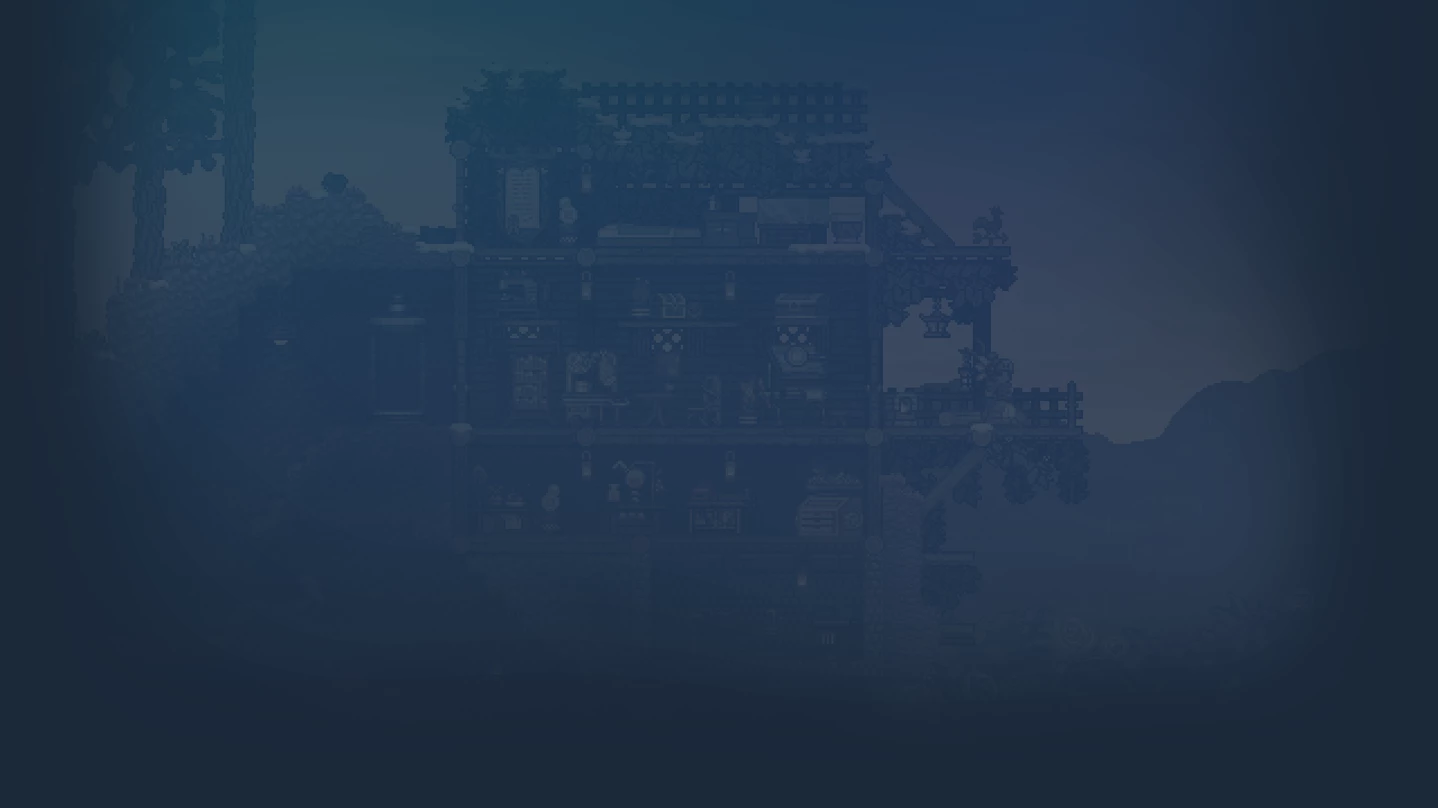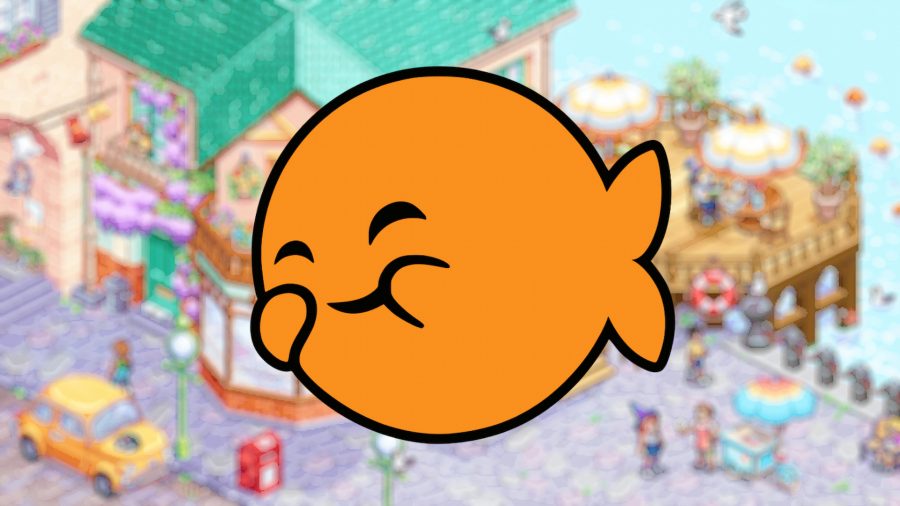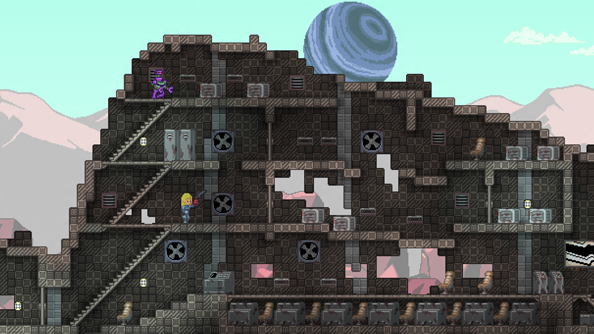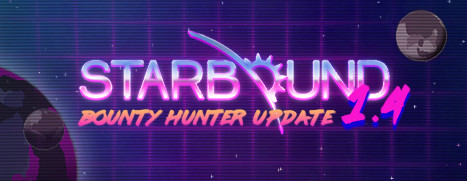
Chucklefish have been busy. Over the last couple of months, Starbound s developers have announced sweeping changes to the game that made their name, and begun the process of relocating the majority of their international team to a new headquarters in London. The phrase bedroom coder doesn t quite apply to developers who have already scaled the heights of the Steam charts, but the change the team is undergoing is similar to the process that took place in the UK in the 1980s, as larger studios formed around games that started life as passion projects.
Starbound s early access success has given Chucklefish the opportunity to become a small publisher in their own right. They ve been working with select indies to help bring their games to an audience, and they re currently hiring a second development team to work on a new game a topdown pirate RPG influenced by The Legend of Zelda.
I don t think we want to become a big company, says Starbound lead designer Tiyuri. Despite the fact that we work with other companies to get their games out, everybody in the company right now wants to participate in those projects in some fashion. I don t want to lose that I don t want to lose the idea that we re small enough for the talent we have to take part in everything we do.
The Starbound community has benefited from this sense of focus already, but they also stand to gain from Chucklefish s evolution into a studio proper. We ve done OK working remotely, but it s certainly not the best way to do things, Tiyuri says. I ll be honest it s probably been our most problematic challenge. Everything takes twice as long. It s going to be so much more efficient being in the same room, and I think it s going to help us creatively as well.
This is a time of significant change for Starbound. In its present version, the 2D game challenges players with survival on procedurally-generated planets within a massive randomised galaxy. You mine for minerals, construct shelters and craft your way up through tiers of gear much like Minecraft or, particularly, Terraria. Where it differentiates itself is in the scale of its randomisation and in the effort being made to give each world a sense of life and history. Planets may have settlements with NPCs, dungeons, or bases full of enemies. Each of these affects the type of experience players will have, and their presence complements Chucklefish s goal to guide the player through Starbound with quests, stories and choice as well as the pursuit of the next level of gear.
It s this goal that is informing the next stage in Starbound s life. The game is in a position now where sweeping changes can be made to content without requiring substantial changes to the underlying engine. What has taken so long in developing Starbound is the technology, not the content, Tiyuri says. We re now at a stage where almost all of it is done and we can throw ourselves into the content and that just doesn t take as long. It s a lot faster, and a lot more fun.
He goes on: the more content in the game the better the experience becomes. We set out to build our engine and our toolset so that you re able to add new content to almost any part of the game without any programming knowledge whatsoever. Our artists aren t simply drawing pictures they re adding new guns, weapons, monsters, all sorts of things. This frees our programmers up to work on bug fixes and engine features.
It s a very fluid environment, Rhopunzel, one of Starbound s artists, tells me. There s no set thing a person does as things to do come in, people just do them.
The structure of the game that surrounds this content is going to change substantially. Instead of progressing through space sectors of escalating difficulty, the bulk of the game will take place within a single sector. Players will be asked to acquire an amount of pixels (Starbound s currency) to open up new places to explore, but unlike the current game you ll be free to acquire pixels however you like. This, then, is the hook for Chucklefish to add lots of new things to do from building a homestead and farming to running missions for NPCs based on outpost worlds. If you d like to keep digging and dungeon-running, you can, but the developers won t be required to stick to that pattern while designing new stuff to do.
What Chucklefish are capable of building, however, will always be exceeded at least in number by what the community can produce. Starbound already has an active modding scene on account of its flexible engine, and in some cases mods have been folded into the official game. I asked Tiyuri if having modders alter the game in its alpha state would affect Starbound s direction as a whole.
We have an idea of what fits the game in its base form, he says in response. A tone to the content. A lot of what modders produce gels very well with our current ideas, but whenever we find a mod and include it in the base game we make sure to tell that modder that we don t want to stifle their creativity. We don t want them to just work to our specifications. We don t want to lead anyone we like the creativity, and it s good that not all of the mods out there conform to what we want Starbound to be.
Instead of overtaking the main game, then, Chucklefish see modding as a valuable counterpoint to their own work. I really like working with modders, says programmer Bartwe. They expand the possibilities they re doing all kinds of things we can t or didn t think to do.
In order to encourage modding, future versions of Starbound will enable server admins to specify mods to be downloaded automatically when players connect to a multiplayer universe. This allows for substantial changes to be made without players needing to download lots of files in advance. It s part of a general effort that Chucklefish are making to turn Starbound into a platform as much as a game a way of creating adventures for other players to go on.
Modding has a role to play in making that a reality, but in-game tools are also a priority. On the list are player-made missions: dungeons or quests that can be built within the game itself then pulled out and distributed as standalone challenges. Using simple logic devices, players will be able to create monster spawners, signposts, and so on. Just as the structure of Starbound as a whole is inspired by console platformers like Metroid and Castlevania, so will players be able to create and distribute their own Metroidvania-style games. These might be fixtures on specific servers, downloads, or instances that players can jump to via the in-game starmap.
Then there s Director Mode. This will be a separate version of the game that lets any player with the right admin access act as a game master on a given server. They ll have a great deal of power to create environments and NPCs they can even control any NPC directly to speak with players or provide a more challenging combat encounter. If you played Neverwinter Nights in multiplayer, you ll have a sense of what Chucklefish are trying to achieve here.
There s this problem with storytelling in games, says Tiyuri. One of the first game I saw trying to do this was Sleep is Death.
Sleep is Death was Jason Rohrer s experimental multiplayer storytelling game, where one player manipulated the game environment to tell a cooperative story with another.
It was a great concept and when it worked, it worked incredibly well. It worked so well that some people came away saying that it was the future of gaming. But one of the things I think that stopped it taking off was that the amount of preparation required was so high it was a real struggle to be the person telling the story.
There s also a problem if the person who s telling the story leaves the computer, Tiyuri continues. Everything grinds to a halt. So we thought we d do something similar, but we d tie it into an existing world and do so in a way that s completely and utterly transparent.
Starbound s existing game logic can be used to make a director s job easier. If they go offline or shift their focus, the AI can take over the characters that they leave behind. Likewise, the same procedural generation technology and progression structures that exist in the regular game will provide things to do when a director isn t present to tell a hand-crafted story.
You can do as much or as little as you want without ruining the experience, Tiyuri says. If I wanted, I could control just one enemy, and, er, have a really annoying enemy.
The future that Tiyuri envisions for the game is one where individual Starbound servers will have their own character and their own stories, combining modding, mission design and hands-on directorship to create as many versions of Starbound as there are players willing to work on them.
Both halves of Starbound s ancestry traditional modding scenes on one hand, creative, freeform games such as Minecraft and Garry s Mod on the other suggest that this plan will be a success. There are more creative people in the world than there are games that furnish them with the tools to be creative. As with any community effort, however, the biggest rewards will go to the players who actively seek out these experiences and involve themselves in the scene.
I ve no doubt that Starbound will be something special to the people who are in the right position to appreciate the way all of these ambitious systems work together.
I wonder, however, about the experience for players who only tap away at the surface without digging any deeper. In particular, I was keen to ask if Tiyuri had any concerns that players would simply use these creative tools to short-circuit the game s progression systems.
To solve that problem, you have to cut out a huge amount of functionality, he tells me. So it s not something we re going to worry about, honestly.
Chucklefish trust players to choose the experience that s right for them. This is an admirable stance, even if it does mean that a certain percentage of players will use the tools available to cheat. A similar logic applies to server admins who abuse their powers at the expense of visitors to their domains.
It s up to you to provide an experience that people want to have on your server, Tiyuri says. If you re messing around and making it unfair, it s likely that people aren t going to want to stay. I m sure that some people will go above and beyond in making their server an amazing place to be.
All of these creative features take on additional meaning when applied to Sector X, Starbound s forthcoming player vs player sector. The PvP experience we re going for isn t all that much about combat, really, Tiyuri says. We re going for a DayZ-like experience. I m not sure anybody plays DayZ for the quality of the shooting it s all about decision making.
Players that choose to set up a farmstead in Sector X will do so in the knowledge that they re under threat from other players, and how they negotiate this situation will be informed by all of the creative tools at their disposal including, potentially, the role of a director or team of directors. It s a promising system, although Tiyuri acknowledges that combat needs a few changes for PvP to operate optimally.
Combat is slightly underdeveloped right now, he says. It s going to be much more robust, and that bleeds into PvP. This means multiple ways to use individual weapons, in particular, as well as reworked shields and spears.
I asked Tiyuri if getting Starbound to the point where it is essentially player-run would mark the end of Chucklefish s involvement in their flagship game.
It ll be a big part of what we re doing for a long time, he says. It s going to take a year to even finish the game, I imagine, and after that we re going to support it for a long time. Eventually, when we do want to move on from it, I don t think it d be difficult to pick people from the community to update the game in an official capacity. I d like to give the community a lot of control once it s reached that stage. In the meantime, I think there s a lot to be said for having a central body managing the project.
The notion that members of Starbound s current community could become the game s official curators in a few years feels like a logical and philosophically apt future for the game. But that future is a way off yet.
I don t think I m ever not going to want to be involved in some way, Tiyuri says. When we hit version one, it ll be the game we planned to make but by that time we ll have so many more things we could add to it. It s a game with so much scope that it s almost difficult to get away from.




